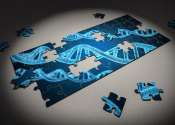Scientists discover new brain changes in early Alzheimer's disease
Researchers at the University of Eastern Finland have discovered new changes occurring in the human brain in the early stages of Alzheimer's disease. The researchers used a multiomic approach to determine RNA, protein, and ...
Dec 20, 2018
0
0








